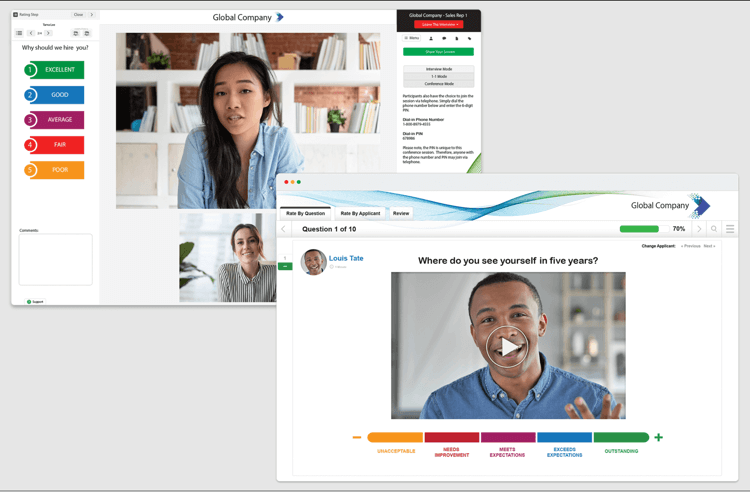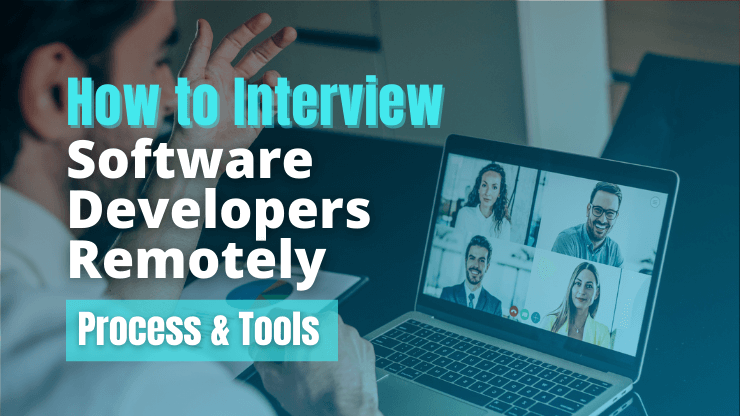Employees are a company’s most valuable asset. Hiring the right people will determine whether your projects and your company succeeds or fails. But, getting the right people is not so simple.
Interviewing done right is a skill, and remember, the candidate is interviewing you also. If you’re unprepared or if you make a bad impression, the software developer will lose interest. If you don’t ask the right questions you won’t even know if you have a qualified candidate.
To complicate matters, the landscape of interviewing is changing, most software jobs are now remote and most will likely stay that way. Remote interviewing offers its own unique challenges. With candidates and interviewers spread out, often across time zones, it’s critical to have a seamless scheduling experience. Gone are the days of asking a candidate to write a solution to a tech problem on a whiteboard. To do a technical assessment of software engineer from afar you will need the right tooling.
Of course, finding someone with just technical skills isn’t enough, they will also need to collaborate and communicate effectively with a team and for that, you must assess their soft skills. Following the right process and utilizing the right tools will provide you with a roadmap to successful interviewing. Let’s get started.
- 3 steps before you start the remote interview
- How to interview software developers step-by-step
- The most frequently interview questions
- 1. Describe the last project you worked on, including any obstacles and your contributions
- 2. How do you determine a project’s success?
- 3. Tell me about a time in your professional career that you failed
- 4. What aspect of our company, product, or team interests you most?
- 5. Where do you see yourself in three years?
- Conclusion
3 steps before you start the remote interview
Before you start the interview, make sure that you and your team are well prepared, know who you are looking for and have all the necessary tools to conduct the interview remotely, this will help you get through this demanding process smoothly. Thanks to this candidates (software developers) will see your professionalism and will remain interested in your offer.
Make sure you're prepared
Aside from preparing questions, refresh yourself on the job description, the requirements, and responsibilities to ensure that you and the candidate are on the same page.
Prepare your workspace in advance of the interview. Use a pen and paper for taking notes (avoid distracting the candidate with keyboard clicking).
Be prepared, as something can go wrong. Have a contingency plan in place for common problems like:
- Slow internet connection or losing it entirely during meetings. Be prepared with your mobile phone hot spot.
- Check your laptop battery is charged enough for the meeting duration. Have a power adapter close to you.
- Your camera and microphone may fail. Check it before the meeting.
Select remote interview tools
As remote work becomes more prevalent, businesses have begun to transition to entirely remote employee hiring. These employees may be spread across multiple time zones or states, affecting how businesses conduct interviews and hire new team members.
To ensure the success of the remote interview process, your business must utilize the appropriate tools and software. The following options can aid in virtual interview facilitation, simplifying the process for both hiring managers and job applicants.
Here are some remote interview tools that can help you with interviews:
Interview scheduling tools
Scheduling video interviews or phone interviews can be challenging, even more so if you communicate via email. These project management tools can help you streamline the process, which benefits both you and the job applicants. This solution is especially good if you use agile development.
Solutions:

- Use Google Meet Events to schedule interviews. They will include link to the meeting, making it easy to hoop into a meeting. Most people have Google Calendar Events are often integrated with desktops and phone calendars, so you will be sure everyone will be there on time.

- Another way to streamline the scheduling process is with Calendly. With the Pro plan, you can share up to six of your calendars through email, so applicants can book an interview in your available time slots. Calendly also offers a free option.
Applicant assessment software
Applicant assessment platforms can inform your next interview. Conducting assessments before interviewing potential candidates helps identify quality candidates, saving you a lot of time, as you can get many interview questions answered before of the interview.
Solutions:

- VidCruiter is a candidate assessment tool that enables automated testing of candidates' hard and soft skills. It approaches video interviews differently. The interview software records one-way candidate interviews for your review, saving you time during the screening process and assisting you in identifying the best candidates for subsequent interviews. This also alleviates scheduling conflicts when interviewing candidates who are already employed full-time and therefore unavailable for interviews during normal business hours.

- Harver was created in consultation with industrial and organizational psychologists. The platform enables a variety of pre-employment assessments, ranging from virtual interviews to cognitive, behavioral, and skill evaluations. Utilize scientifically verified assessments, predictive analytics, and workflow automation to quickly and easily hire the right people.

Provide information to the team
Invite other team members to participate in the interview. Prospective software developers appreciate meeting the people with whom they will be working closely. From the existing team's perspective, they'll appreciate the ability to express their opinion and gut feeling about each candidate especially if they are to be software engineers.
Ensure that each co worker is briefed on who will lead the interview at which point. Additionally, ensure that everyone understands how to mute their mic when not speaking to minimize background noise.
How to interview software developers step-by-step
Plan your remote interviews
Fear of the unknown can be the most terrifying of all fears (especially for developers). Candidates will feel enormous relief once they understand what to expect.
Schedule all of your interviews in advance so that candidates are aware of the date, time, and duration of the interview. Back-to-back appointments will also serve as a reminder to stay on track and adhere to appointment durations. Candidates can select an interview time that fits their schedule but is also convenient for them using scheduling tools such as Calendly.
You can frequently use these tools to set up automated email and text reminders to ensure that candidates do not forget to attend. It is easier to forget about a virtual appointment than it is to forget about an in-person appointment.
Send brief of interview
Prior to the interview, send an email to each candidate outlining the process. This is critical for any interview, but it is especially critical for remote interviews. This may be the candidate's first experience with a virtual interview.
Include the following in the email instructions:
Date, time, time zone, and anticipated duration of the interview
The names and job titles of those who will participate in the call.
Which tools they should have established – possibly Google Meet, Zoom, or Microsoft Teams
How to configure the tool – do not assume that a software developer is automatically capable of configuring all software without instructions.
How to join the remote interview session, including any required login credentials
A gentle reminder to conduct a trial run prior to the interview and to allow time for troubleshooting.
What to do if the call is terminated
How they should prepare for the interview, with an indication of the types of questions that may be asked
Additionally, you should emphasize the importance of maintaining the etiquette associated with an in-person interview. Attendees for remote interviews should be scheduled on time and in an environment free of background noise or distractions.
Remote interviews require additional etiquette as well. Everyone should pause for a few seconds after speaking to avoid latency-induced speech overlap. Additionally, everyone should speak clearly and directly to the camera. Finally, they should provide an occasional visual cue to indicate their continued presence.
Interview candidates on remotely meeting
When interviewing candidates, whether in person or over the phone, make sure to evaluate not only their technical abilities and expertise but also their personal and professional characteristics.
Because you are essentially recruiting new employees, you must ensure that the dedicated developers you hire have the appropriate attitude for the project and the personality to work well with your in-house team.
After all, you are the expert on the types of people who naturally fit into your team.
Give valuable feedback
According to LinkedIn, 94% of interviewees desire feedback following their interviews in order to improve. However, only 41% have ever received it. For developers, 50% say the slow feedback is the most vexing aspect of the hiring process.
As a result, always provide candid and timely feedback to your candidates (above all, those who put in the effort to prepare for and sit the interview).
Don't forget to express gratitude to each candidate for expressing an interest in working for your company. Who is to say? Candidates who are unsuccessful may be excellent candidates for future open positions.
Indeed, candidates are four times more likely to return to your company for future job opportunities after receiving constructive feedback from you previously.
The most frequently interview questions
Many software developer interview questions will focus on your tech skills, such as what programming languages you know. We assume those have been done in the screening process and that you want now to know about your problem-solving skills and analytical abilities. This will help you to determine whether or not a candidate will fit in well with the company culture. In this case, it is not enough to be a good software engineer who can write code. Here are some examples of software engineer interview questions:
Describe the last project you worked on, including any obstacles and your contributions
A question about a specific project will help you gain a better understanding of how you process information and how you deal with adversity while working on that task.Whether it was object oriented programming or something else Discuss the tasks assigned to you in order to establish your level of responsibility. When describing the action you took, begin with the steps you took to accomplish a goal and conclude with the project's outcome.
How do you determine a project’s success?
While shipping high-quality software is essential, software that doesn’t address the needs of the user and the business produces little value.
Check if candidate can think outside the box and solve real-world problems. This frequently boils down to identifying a metric to improve and developing a testable hypothesis about the anticipated impact of your project.
Tell me about a time in your professional career that you failed
This can be a difficult question to answer if the candidate is unprepared. Make him/her feel safe to admit his/her flaws. Let me know interview why you are asking this question, explaining this question allows you to demonstrate the ability to make the best of a bad situation. Following an explanation of the issue, including a description of how you resolved it to demonstrate your problem-solving ability.
What aspect of our company, product, or team interests you most?
Retention is a high priority in agile software development process. It can be quite costly to replace a team member in terms of recruitment and training time. Look for details that speak specifically to the company's values, past projects, or a job description responsibility that aligns with the career path you can offer.
Where do you see yourself in three years?
This question emphasizes the competencies the interviewed software developer is hoping to learn and improve. This enables you to determine whether a candidate will be a long-term employee and whether your goals align with the company's. Encourage truthful answer to this question.
Conclusion
Executing a proper interview is a lengthy process. Preparation is needed, you must be familiar with the candidate and the role to formulate the right questions. Interviewing requires diligence, carefully listen to the candidate’s responses, ask the right follow up questions and record your notes.
Finally, interviewing requires careful analysis, meeting with your team to evaluate both the good software engineer and perform a retrospective on the interview process. All of this may seem time consuming, but it is well worth the investment. A professional interview will always leave a positive impression and lead to exemplary hires. A sloppy interview will repel the best software developers and lead to mediocre hires. The people you hire will ultimately determine your company’s fate, be sure you are choosing wisely.





![7 Steps to Scaling Software Teams Faster [with Startup Case Studies]](/uploads/blog/scaling-software-teams/scaling-software-teams.png)
